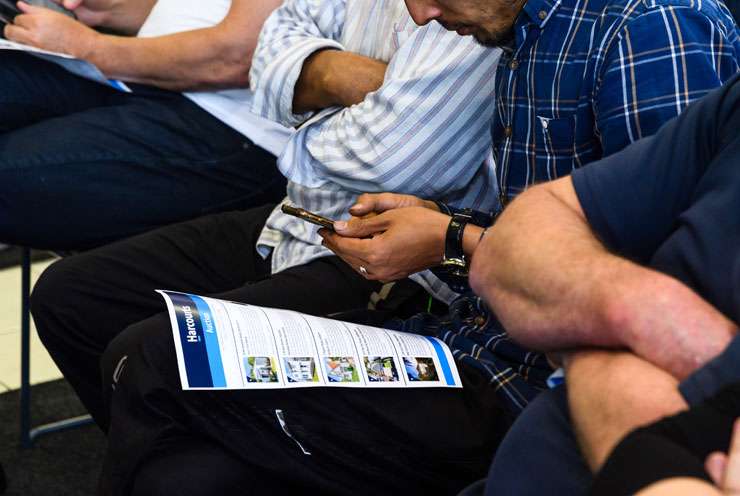Despite the spectre of further Delta outbreaks hanging over New Zealand, some industry experts think more lockdowns won’t make much difference to the overall trajectory of the housing market.
“I still think at the moment the housing market will continue undeterred by lockdowns and similar,” says Brad Olsen, principal economist with Infometrics.
Housing activity has continued with demand still buoyant, he says.
“We haven't seen any big shifts on that front and given we haven't seen any particular changes, or any sort of catastrophic or large-scale changes to employment, people are still going to be looking for a house.”
Start your property search
The OneRoof house price index shows the average value of a property has reached $1m on the back of a year of house price surges but Olsen says people will always pay more if they can borrow more.
And he doesn’t think Reserve Bank changes will stop people wanting to buy housing.
“We're still seeing the sentiment there around people wanting housing and that seems to be continuing unabated, particularly with those lower interest rates and similar.”

Auctions rooms have had a busy year, but level 4 and 3 restrictions have seen them move online. Photo / Getty Images
Jen Baird, the chief executive of REINZ, says outside of the delays caused by lockdowns there is still confidence in the market.
“What we have seen with this lockdown compared to the big one we had at the beginning of last year is the level of confidence and resilience in the market, and what you can see from the August numbers that REINZ released was that people still have confidence in property prices.”
Level 3 and 4 lockdowns severely restrict real estate activity but given the confidence around prices, “unless something significant changes we don’t see any real change in the market as such in the medium term”.
This year the Reserve Bank and the Government have put in place measures to slow house price growth, but so far these haven’t affected the market.
Baird says there is not enough stock to satisfy demand right now. Listing levels have been on a downwards trend line for some time now, but the lockdown has exacerbated the situation, with vendors either unwilling or unable to list.

REINZ chief executive Jen Baird: “[The] spring lift is absolutely coming.” Photo / Supplied
Some homeowners are also worried they may not be able to find another house to buy if they sell now. “Coming out of a lockdown that might be even more challenging,” Baird says. “Lots of people are thinking about how they can create a deal that's going to give them some certainty.”
Another difference from the last big lockdown is that we are coming into spring, a traditionally busy period for the housing market.
“We're coming out of a winter into spring and we always see a surge in listings at this time of year,” Baird says.
“What I'm hearing from the industry is that spring lift is absolutely coming - it's a little bit delayed, and more so in Auckland with the lockdown restrictions.”
Barry Thom, a director of UP Realestate, says the impact of lockdowns on the housing market also depend on what happens to business. “If businesses are severely affected, then confidence will be dented and people's appetite for more, bigger, better would have to be impacted.”
The first home buyer market would probably continue but that would be on the basis people had a job. “If society is impacted to the point where we begin to suffer significant business closure and employment gets to be affected, confidence goes and if confidence goes then that basically underpins the share market, the property market and everything else,” Thom says.
“You can't expect resilience regardless of consequence and if we're in particularly a Level 4 situation, or even in Level 3-plus to the point where businesses can't function the way they need to function to be profitable then we're going to have an issue to be sure.”

Valocity director of valuations James Wilson says the main drivers of growth are still in play. Photo / Supplied
Offsetting that is immigration because there is a high demand from Kiwis wanting to return home and get into housing.
“But look, right now it’s a little bit of a crystal ball gaze. Let’s hope we bounce out of this quickly. Certainly, where we sit today there would appear to be good demand for a limited amount of stock but I think people's resilience continues to be tested.”
James Wilson, director of valuation with Valocity, OneRoof’s data partner, says there have been learnings from the first lockdown, when many thought values would fall off a cliff. “As we know, fast forward 12 months and they didn’t do that at all,” he says.
Values only went one way – up – and were driven mostly by demand outstripping supply and the low interest rates.
Those key drivers were still in play and would only support growth.
However, the rate of growth is beginning to slow because of general affordability issues across buyer groups.
“People just go ‘look, the going has been good, I've made my purchase, I've got my equity I'm actually going to sit back now. That mindset only promotes lower activity levels in the market and, therefore, slower value growth.”
Miles Workman, a senior economist with the ANZ, says if New Zealand keeps yo-yoing in and out of different lockdown levels but the Government response continues to be generous, provided there is not a deterioration in household and general confidence, the housing market would survive.
“For the current lockdown, we are thinking that housing confidence, household incomes, are going to come through this okay.”
There will be volatility in the data but the underlying demand is still there.
“But I think it’s very important to keep an eye on those confidence channels because there are a lot of headwinds now for housing.”
Those include affordability, higher interest rates, and tighter LVR restrictions.
“These things can all come home to roost at once perhaps and cause things to turn a bit sharper than people are expecting.”













































































